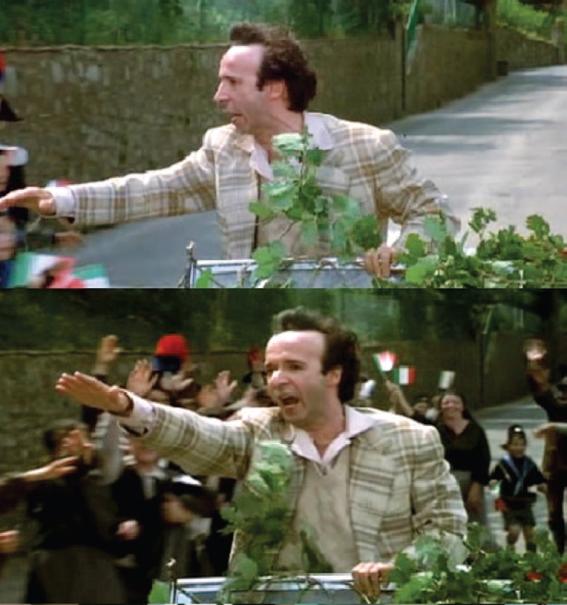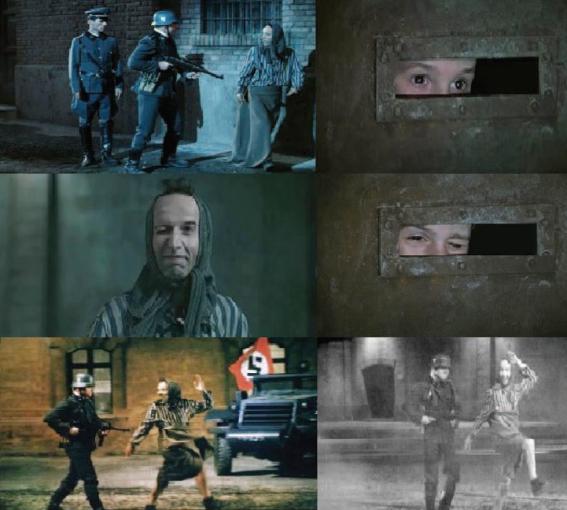Many international clashes have captured global attention recently and Israel’s dispute with the Palestinian people has made headlines a lot over recent months. Israelis are a nation of people determined to survive in an Arab region with a
long standing dislike and distrust for Jewish people. Jews ended up in Israel after the end of the Second World War when the United Nations agreed on a land offer that would see their people finally settle in a homeland of their own, after suffering through the years of near racial annihilation at the hands of the Germans during the Holocaust. The movie ‘Life is Beautiful’ centers around the story of the Jewish Holocaust.
If you are in the mood for a comedy or if you want to feel a father’s instinctive love, you need to watch this movie. It will make you laugh at the beginning and get a strong sense of paternal love during the latter part of the film. When the movie is over, sad emotions will linger with you for a long time and your heart will retain a strong lesson on morality.
Life is Beautiful is a 1997 Italian film directed by Roberto Benigni. This film is based on his father’s story. His father had survived three years of internment at the Bergen-Belsen concentration camp. The background of the film is a concentration camp during the Second World War. The last line of this movie is ‘This is my story. This is the sacrifice my father made. This was his gift to me.’ This line reminds viewers that this film is based on his real story.
Benigni, the movie director, played the leading role in his movie. In fact, he directed, wrote the screenplay and was the leading actor in the film. His style was quite creative as he managed to take the horrors of the holocaust and turn it into a light hearted comedy movie of sorts.
During the first scene, Guido (a Jewish man and the main character) walks through a crowd that is waiting for Hitler to pass by in a car. Unfortunately, the car’s brakes don’t work, so he shouts “Get back!” while raising his right arm, seemingly replicating Hitler’s trademark ‘raised right arm’ salute. The crowd gleams with enthusiasm, mistaking Guido for Hitler.
 |
A situation where a Jew is regarded as Hitler reflects some strong and bitter satire. This film is rampant with ironic satirical epresentations of the society of that time. It becomes clear very early on that the film genre is a tragic comedy drama. It is arguably one of the best examples of black comedy in the world.
This film also provides a moral lesson for today’s modern society. These days, many wealthy people treat others arrogantly and with bossy attitude. The lesson people can learn from this film stems from the line, ‘You’re serving. You’re not a servant. Serving is a supreme art. God is the first servant. God serves men, but he’s not a servant to men.’ These are important words that contemporary society should keep in mind.
The film is divided into two parts. The first part is a love story between Guido Orefice, a Jewish man, and Dora who is not a Jew. In real life, Guido and Dora are a real married couple and they always appear in the same films. They are a very romantic couple in the real world, so their acting together in this film was fluid and very natural. As a result, viewers are able to easily concentrate on the story and the quality performances sometimes delude us into thinking the movie is really happening.
In the film, Dora is engaged to a rich, but arrogant man. Guido kidnaps her from her engagement party carrying her off on a horse, humiliating her fiance and mother. It is a very impressive scene because the horse is painted green and its back is covered with ‘ACHTUNG! CAVALLO EBREO’, which means ‘Attention! Jew’s horse.’ It foreshadows their sad ending by affirming Jews can’t be happy forever.
Soon after they marry, they have a son they call Giosue. Later in the film, during the Second World War, Guido and Giosue are forced onto a train and taken to a concentration camp. Dora, unwilling to be separated from her family, volunteers to go to the camp too, though she is not a Jew. The scene has viewers contemplating the meaning of true love. This is something missing from today’s far too instantaneous love, experienced by many couples.
The second part of the story takes place at the concentration camp. At the camp, Guido explains to Giosue that the camp is a complicated game. At one point, when the camp was in chaos, Guido goes off to find Dora. Unfortunately, he gets caught by a German soldier and sentenced to death. While the soldier is leading him to his death, Guido passes by Giosue. Guido continues to act like he is playing a game with the soldier. In this scene, viewers get a strong sense of the paternal love that bonds this father and son.
 |
Guido may feel fear when he is being led off by the solider to be executed, however, he doesn’t reveal his fears to his son. Rather, he walks more ridiculously while passing by his son in order to make him laugh. The climax of this scene is heartbreaking for viewers, making each one feel extremely grateful for their fathers to be alive and by their side.
The message of this film may be that ‘happiness comes from the smallest things.’ Happiness is spread out during our lifetime. It only takes the smallest gestures to make us happy. Therefore, always being optimistic is very important, as Guido proves in this film. All of life is not beautiful, but when you think it is, it can be.
Germany’s policy of Jewish extermination was terrible as illustrated by this film, but Israel’s long standing dispute with Palestine has not brought peace to the people. Israelis and Palestinians alike are suffering from the deaths of family members and friends as a result of their ongoing battles. It is really important to remember that deaths of innocent people should never be accepted. When reflecting on the pathetic life of Giosue, everyone should do their best not to repeat the mistakes of the past.
Cho Ah-young dkherald@hotmail.com

![[Campus Magnifier] Let's Surf the Library!](/news/photo/202404/12496_1765_4143.jpg) [Campus Magnifier] Let's Surf the Library!
[Campus Magnifier] Let's Surf the Library!
![[Campus Magnifier] Let's Surf the Library!](/news/thumbnail/202404/12496_1765_4143_v150.jpg)





